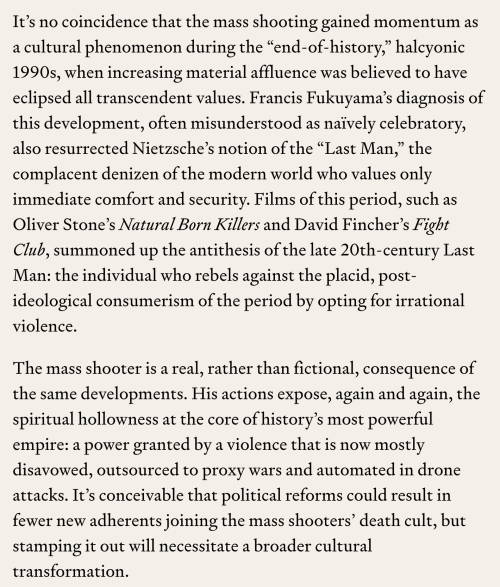#geoff shullenberger
—Geoff Shullenberger, “The Faith of Mass Shooters”
Insofar as we need a cultural explanation, and not an MK-Ult(u)ra(l) one, this is probably it, not that those two possibilities are strictly inconsistent. For my take on how we can have Fukuyama-without-violence, see here (essay) and here(podcast):
The only way liberal democracy can fall short of humanity’s final political synthesis is if it too harbors an inherent contradiction necessitating further conflict. Now Fukuyama brings another alarming Teuton onstage to consider this possibility—for didn’t Nietzsche say that liberal society produces the bathetic creature he labelled “the last man,” a cow-eyed consumer so lost in complacent satisfactions that he lacks any thymos at all? (Nietzsche’s contemporary heirs—ultra-right-wing online shitposters—have their own pungent labels for this archetype: the soyboy, for instance, or the bugman.) And doesn’t this last man at the end of history eventually become so disgusted with himself that he begins to long for an apocalypse of the sort that ended Europe’s long peace in 1914 when the citizens of the nations clamored for a cleansing war?
Fukuyama says yes to this dire possibility. As a solution he proposes that liberal society must allow illiberal pockets in private life—religion, sports, art, etc.—to drain humanity’s incorrigible thymos away from the political realm while still satisfying our urge to rise up and be recognized as not merely equal to but better than our neighbors in at least some arenas. To put it more coarsely than he does, we may need a little fascism in our poetry or our football games or our church services to keep fascism out of the government.
For my response to Bataille, whom Shullenberger cites elsewhere in the piece, see here—limited to my reading of his most famous novel, all I’ve read of him, but enough to get the point. I took the excess violence or violence-as-excess in the pornographic novel more as prescription than diagnosis, but perhaps in that essay, significantly written and posted on the 7th of November 2016, I was being too moralistic:
Mothers and sisters—that is, female blood relations—are presumably sickening for Bataille because, like eggs, they stand for generation and their menstrual blood for the processes that generate life. The eye, on the other hand, stands for visionary perception, but it too must be debased because the eye’s idealism has in the western tradition also upheld life by associating it with a higher ideal, God or the Platonic forms or, simply, the truth. Bataille and his heroes are inverted Platonists, no less in love with an ideal, but a dark and negative ideal, an upside-down sublime, a mountain standing on its head, a photo-negative of the good, an anti-truth of the rapture of torture.
[…]
All in all, Story of the Eye is a typical piece of “French extremity,” to cite the film genre, a narrative tradition almost unchanged since the days of Sade, whose books I have never succeeded in finishing, and which continues onscreen today. Mechanically reversing the traditional pieties of the west like flipping a series of switches, the devotees of extremity have created a pious tradition of their own, carried on to a stultifying extent in the institutions of culture, particularly the art world and some wings of academe.
Post link

